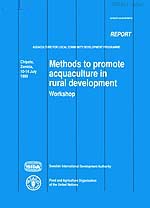 | ALCOM - AQUACULTURE
FOR LOCAL COMMUNITY DEVELOPMENT PROGRAMME - GCP/INT/436/SWE/REP/5
REPORT OF THE WORKSHOP ON METHODS TO PROMOTE AQUACULTURE IN RURAL DEVELOPMENT
Chipata, Eastern Province, Zambia
10–14 July 1989

SWEDISH INTERNATIONAL DEVELOPMENT AUTHORITY
FOOD AND AGRICULTURE ORGANIZATION OF THE UNITED NATIONS
Harare, 1990
|
| The designations employed and the presentation of the material in
this publication do not imply the expression of any opinion
whatsoever on the part of the Food and Agriculture Organization of
the United Nations concerning the legal status of any country,
territory, city or area or of its authorities, or concerning the
delimitation of its frontiers or boundaries. |
The designations employed and the presentation of
material in this publication do not imply the expression of
any opinion whatsoever on the part of the Food and
Agriculture Organization of the United Nations
concerning the legal status of any country, territory, city
or area or of its authorities, or concerning the delimitation
of its frontiers or boundaries.
All rights reserved. No part of this publication may be reproduced, stored in a retrieval system, or
transmitted in any form or by any means, electronic, mechanical, photocopying or otherwise, without
the prior permission of the copyright owner. Applications for such permission, with a statement
of the purpose and extent of the reproduction, should be addressed to the Director, Publications
Division. Food and Agriculture Organization of the United Nations. Via delle Terme di Caracalla,
00100 Rome, Italy.
© FAO 1990
PREFACE
The Workshop on Methods to Promote Aquaculture in Rural Development
reported in this document was an activity of ALCOM - Aquaculture for
Local Community Development Programme. The workshop was a forum for
presenting and discussing the results of ALCOM's first pilot project,
Field Testing of Aquaculture in Rural Development, Eastern Province,
Zambia.
ALCOM is an inter-regional programme executed by FAO, with a preparatory
phase funded by Sweden (SIDA) from 1986–1989. Initially, ALCOM focusses
on the activities of the SADCC countries.
The main objective of ALCOM is to develop, test, and demonstrate
strategies, methods, and techniques by which rural populations can
improve their standards of living through aquaculture.
During the preparatory phase work concentrated on desk studies,
missions, surveys and technical consultations at the regional level, and
on the pilot project in Eastern Province, Zambia. The activities are
ultimately aimed at methodology development and are intended to provide
the basis for continuing aquaculture development efforts during ALCOM's
second phase.
| Harare Office: | c/o FAO Representative |
| Mail: | P.O. Box 3730, Harare, Zimbabwe |
| Telex: | 26040 FAO ZW |
| Fax: | +263-4-729563 |
| | |
| Lusaka Office: | Central Fisheries Research Institute, Chilanga |
| Mail: | P.O. Box 30563, Lusaka, Zambia |
| Telex: | 44510 FAOZM ZA |
| Fax: | +260-1-221927 |
1. INTRODUCTION
2. OPENING OF THE WORKSHOP
3. PILOT PROJECT, EASTERN PROVINCE, ZAMBIA
4. FISH FARMING EXTENSION METHOD AND GUIDELINES
4.1 METHODOLOGY DEVELOPMENT
4.2 GUIDELINES
4.2.1 INFORMATION GATHERING
4.2.2 SITUATION ASSESSMENT
4.2.3 EXTENSION EXECUTION
4.2.4 FOLLOW-UP SERVICING
4.3 DISCUSSION
5. EXTENSION TRAINING LECTURE
6. COMMUNICATION IN FISH FARMING EXTENSION
7. FISH FARMING EXTENSION METHODS USED IN ZAMBIA
8. CONCLUSIONS AND RECOMMENDATIONS
Appendix 1: List of Participants
Appendix 2: Agenda
Appendix 3: List of Documents
How to Order

